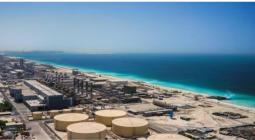TUNISIA: Zarat water desalination plant launched to serve 3 governorates
The town of Zarat in Tunisia has a new seawater desalination plant. Va Tech Wabag, an Indian company, built the plant, which will provide drinking water to around 1 million people in three governorates.
The Zarat seawater desalination plant was inaugurated on 7 July 2024 by the President of Tunisia, Kaïs Saïed. The plant, which has a capacity of 50,000 m3 of drinking water per day, is expected to cover the needs of more than one million people in the governorates of Gabes, Médenine and Tataouine by 2035 (with capacity to be extended to 100,000 m3 by 2027).
Seawater is pumped from a pumping station through a network of pipes with a diameter of 1,800 mm. It is then stored in two tanks, each with a capacity of 10,000 m3. Va Tech Wabag, which carried out the work, also built a brine discharge system at sea with pipes 1,400 mm in diameter, itself connected to the existing network. The company, based in Chennai in the Indian state of Tamil Nadu, provided engineering, procurement and construction services under an agreement signed with Tunisia’s National Agency for Operations and Water Distribution(SONEDE) in 2019.
Limiting overexploitation of the water table
Following the inauguration of the new facility, the government of the North African country plans to bring it into operation at the end of July 2024.
As well as improving the supply of drinking water in the target governorates, the completion of this project will also reduce the pressure on groundwater, which has been overexploited for several years due to the drying up of surface water as a result of drought. The Tunisian government has co-financed the work with the Kreditanstalt für Wiederaufbau (KfW), the German development agency, to the tune of 231.6 million dinars, or 96.5 million euros.
This is the first in a series of three seawater desalination plants, due to open by the end of 2024. The other two plants are located in the Tunisian cities of Sfax and Sousse.
Cover photo: By AFRIK21





